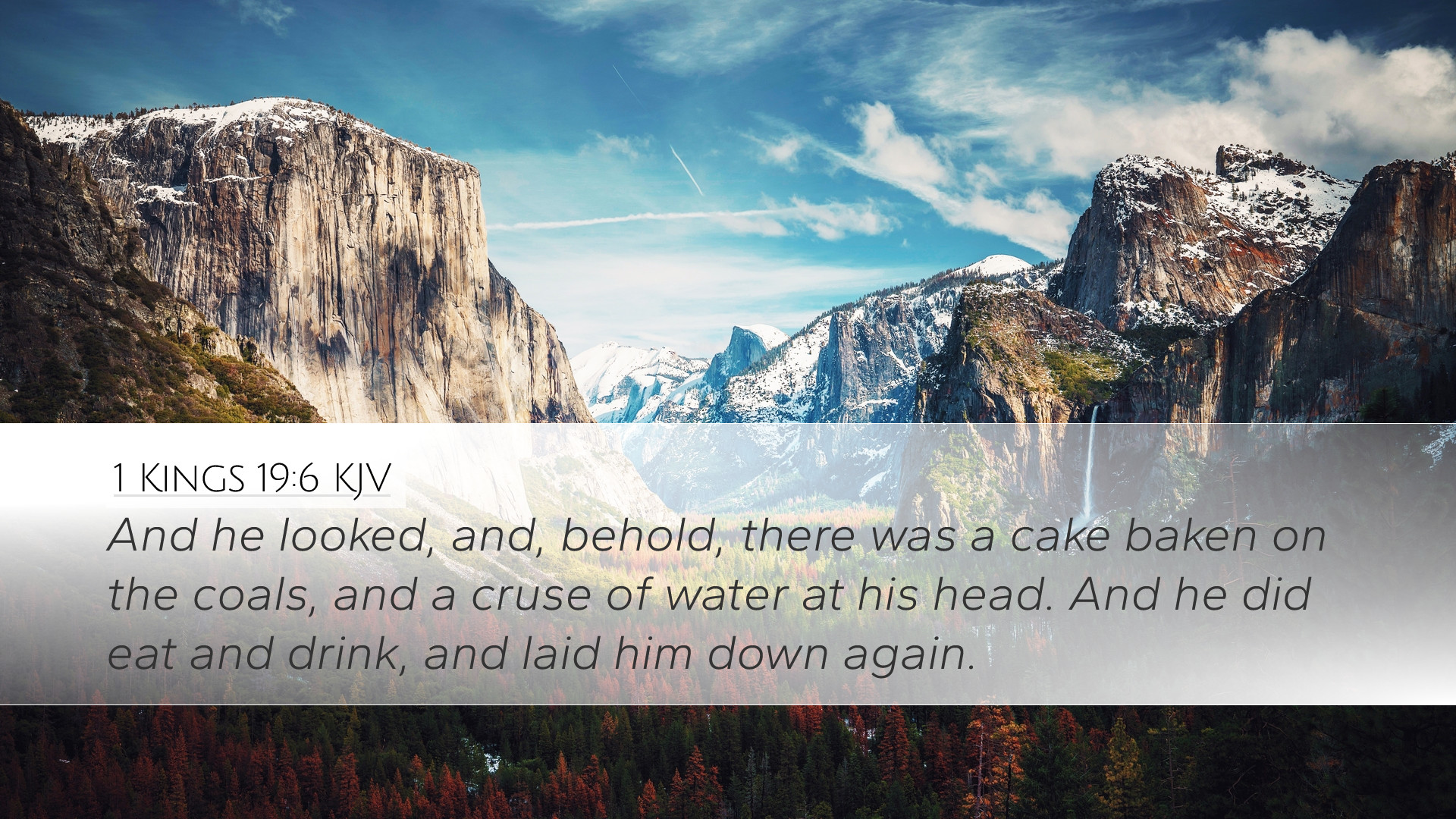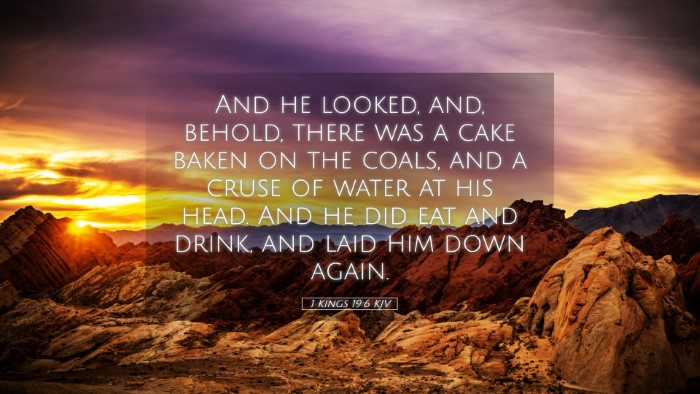Old Testament
Genesis Exodus Leviticus Numbers Deuteronomy Joshua Judges Ruth 1 Samuel 2 Samuel 1 Kings 2 Kings 1 Chronicles 2 Chronicles Ezra Nehemiah Esther Job Psalms Proverbs Ecclesiastes Song of Solomon Isaiah Jeremiah Lamentations Ezekiel Daniel Hosea Joel Amos Obadiah Jonah Micah Nahum Habakkuk Zephaniah Haggai Zechariah Malachi1 Kings 19:6
1 Kings 19:6 KJV
And he looked, and, behold, there was a cake baken on the coals, and a cruse of water at his head. And he did eat and drink, and laid him down again.
1 Kings 19:6 Bible Commentary
Commentary on 1 Kings 19:6
Text of 1 Kings 19:6: “And he looked, and, behold, there was a cake baken on the coals, and a cruise of water at his head. And he did eat and drink, and laid him down again.”
Contextual Background
The narrative of 1 Kings 19 occurs shortly after the dramatic confrontation between the prophet Elijah and the prophets of Baal on Mount Carmel. Following his victory, Elijah flees from Jezebel, who threatens his life. This chapter illustrates a profound moment of despair and divine sustenance, shedding light on God's care for His servants in times of distress.
The Divine Provision
“And he looked, and, behold, there was a cake baken on the coals, and a cruise of water at his head.”
- Matthew Henry: Henry emphasizes the miraculous nature of the divine provision. Elijah is provided for not by human means, but through supernatural means, illustrating God's direct intervention in the lives of His prophets.
- Albert Barnes: Barnes highlights the significance of “a cake baken on the coals,” suggesting it symbolizes nourishment not only for the body but for the soul, grounding Elijah in the reality of God's continuing presence.
- Adam Clarke: Clarke expounds on the term “coals,” relating them to God's cleansing process. He reflects on how God often uses fire, both in the physical and spiritual, to prepare us for service.
Elijah's Reaction
“And he did eat and drink, and laid him down again.”
- Matthew Henry: Henry notes that after eating, Elijah does not remain energized or triumphant; instead, he returns to a state of weariness. This underscores the reality of human frailty, regardless of divine encounters.
- Albert Barnes: Barnes interprets Elijah’s action of lying down again as a metaphor for spiritual rest. In times of fatigue and discouragement, rest is not merely physical but encompasses spiritual rejuvenation.
- Adam Clarke: Clarke points out that the act of resting reveals that, even after divine intervention, Elijah still grapples with his fears and exhaustion. It serves as a reminder that even the strongest prophets need periods of recovery.
Theological Implications
This narrative raises several theological principles that are relevant for pastors and scholars:
- God's Sustenance: The provision of food and drink illustrates God's care for our physical needs, highlighting that spiritual leaders are also in need of physical nourishment.
- The Importance of Rest: God recognizes our limits and the necessity of rest. This moments showcase that spiritual burnout can affect even the most committed servants.
- God's Personal Attention: The individualized care provided to Elijah demonstrates that God is intimately aware of our circumstances and responds to our needs with personal affection.
Application for Ministry
To apply the insights of this passage within a pastoral or scholarly context:
- In Support of Leaders: Encourage an environment within the church where leaders feel safe to express their human vulnerabilities and receive support.
- Holistic Care: Emphasize the importance of addressing both spiritual and physical needs within congregational life, recognizing the interplay between body and spirit.
- Modeling Rest: Pastors should model healthy rhythms of work and rest, understanding that fatigue often accompanies periods of spiritual intensity.
Conclusion
The account of Elijah in 1 Kings 19:6 serves as a poignant reminder of God's mercy in moments of despair and emphasizes the need for both physical and spiritual nourishment. For pastors, students, and scholars, this text not only reflects God's providential care but also underscores the realities of human experience and the necessity for rest. The balance of divine intervention and human vulnerability stands as a call for all believers to trust in God's provisions in times of trial.


